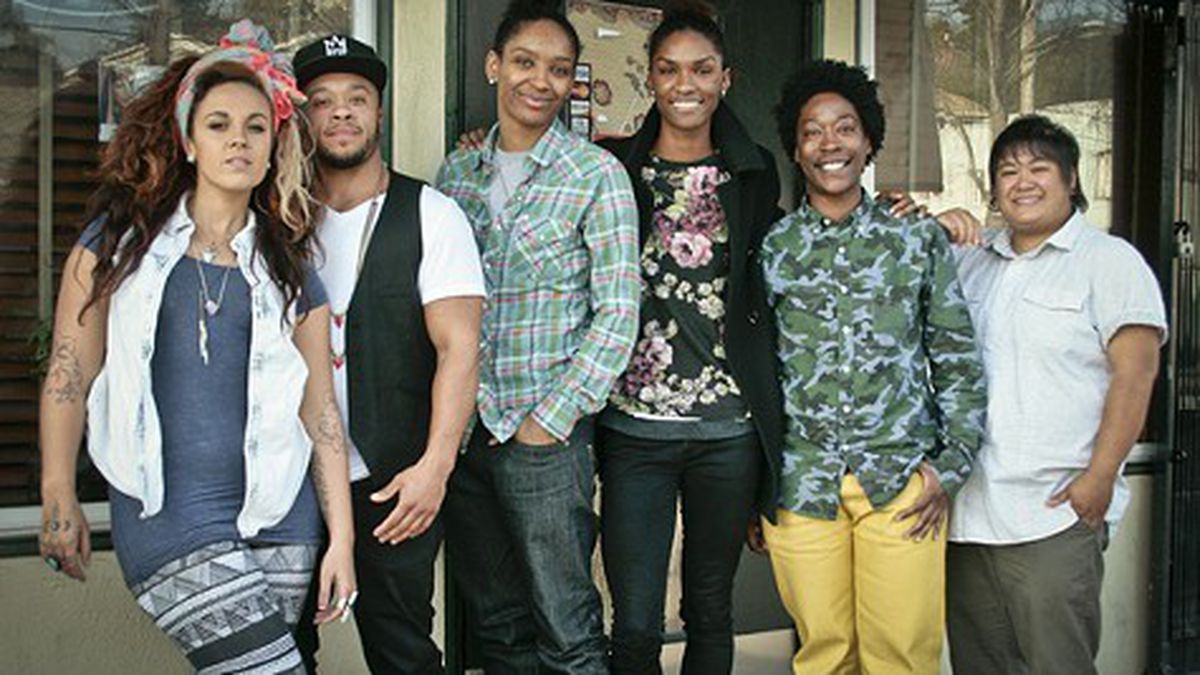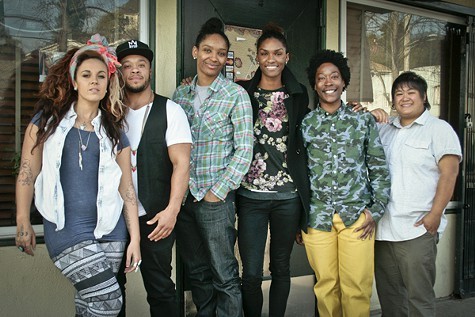Oaklanders keep it real. And last night, almost 2 million viewers watched as five queer people of color from the Town schooled the cast of MTV’s Real World: Ex-Plosion on a topic that’s been steadily garnering more media attention: transgender identity.
The subject came up around 25-year-old cast member Ari Fitz (who goes by Arielle Scott on the show), a black lesbian, androgynous model, and horror filmmaker who was born in Vallejo and most recently lived in Oakland.
Halfway into taping the show — which was filmed in San Francisco last summer and is currently airing on Wednesday nights — rumors about Fitz being a transgender woman surfaced on the Internet and among cast members. Her initial reaction to the rumor — which was false — was negative. “I don’t want to be trans,” she says during last night’s episode, expressing that she felt the misidentification threatened her lesbian identity.
[jump]
But Fitz feels uneasy about her feelings, so she invites five of her Oakland friends — Kingston Farady, Krys Freeman, Amaryllis DeJesus Moleski, Chaney Turner, and Charleen “Chikun” Caabay, who all embody various gender identities, gender expressions, and sexual orientations — to talk her through her feelings, and help educate her fellow cast members at the same time.
“I was feeling some type of way because the Internet decided I was trans,” Fitz said in a recent interview, “and everyone in the house was talking about it, too. I wanted to know if feeling negative was even a good feeling to have, so I reached out to my community to come and talk about it.”
The resulting discussion between Fitz, her friends, and her roommates about gender identity and expression gets distilled into a brief five-minute segment, even though Fitz said that the actual encounter lasted nearly four hours. Nonetheless, “it’s the start needed to get people asking questions,” Farady said in a recent interview.
Farady, 31, is a black queer transman, activist, actor, and writer. As the only trans-identified individual of the group, he initially had reservations about participating. “I knew there would be gaps because you can’t capture this conversation in a few minutes on reality TV,” he said. “I also knew it would create critique around the perception of one person talking on behalf of all trans people. But I figured, criticism, dramatization, and misrepresentation or not, people would see a black trans person visible on TV, and start talking. My decision to participate was to create discussion.”
Last night’s episode touched on the way a person can have many layers of identity. Freeman, 29, is a black queer masculine-of-center woman whose work combines LGBT activism and entrepreneurship. DeJesus Moleski, 28, a queer brown femme, is a visual artist who portrays individuals living at the intersections of race, class, gender, and sexuality. Turner, 34, identifies as an African-American queer masculine-of-center woman, and is one of the most well known event producers inside and outside the East Bay’s queer community. Caabay, 35, a queer Pinay masculine soft butch, is the owner of Kainbigan, a Filipino restaurant in Oakland.
As for Fitz, she is cisgender, meaning her gender identity matches her assigned sex at birth — female. If she were transgender, her gender identity would not match her assigned sex at birth. Fitz’s gender expression is androgynous, the combination of masculinity and femininity expressed through her style and mannerisms. When people misidentify her as trans, it’s likely that confusion between her gender identity and gender expression is occurring, neither of which have anything to do with her sexual orientation, which is lesbian.
“But,” Farady said in a recent interview, “her reaction, a commonplace response that most people would have, begged the question, why is it threatening to be misidentified as trans? What is the phobia around transness? That somehow you lose power and desirability by being perceived as trans? There’s this idea that trans women aren’t real women or trans men aren’t real men. It stems from the idea that gender authenticity is wholly based on your anatomy, or your genitals, really.”
That’s a poignant statement that all cisgender people can reflect on, not just Fitz. Although, there’s something to be said for the bravery it takes to have your learning curve displayed on reality TV.
“That was one of the hardest moments for me in the house,” Fitz recalled in a recent interview. “I don’t think enough time was spent on the conversation, but I’m happy that people have the opportunity to watch me learn and deal with my own ignorance. All my roommates, too, had their own moments of immense reflection.”
While not included in the episode, Farady took the discussion further with one of the cast members. Brian, Jenny’s “ex,” told Farady that he likes to tweeze his eyebrows, a stereotypically feminine habit.
“He started to grasp the difference between gender identity and gender expression,” Farady said, “and that they exist on two different spectrums. Plucking his eyebrows, a form of gender expression, doesn’t make him less of a masculine heterosexual cisman. That example provided a basic platform to begin to understand the differences between gender identity, gender expression, sexuality, etc.”
Farady also brings up “passing,” a term used to gauge how well a transgender person outwardly “passes” as their internal sense of gender. At one point, the show cuts to the confessional booth where cast members Cory, Jay, and Thomas talk about Farady’s success in passing for male and, while unknowingly (but problematically) attach legitimacy to Farady’s gender identity by way of his “convincing” physical appearance.
“This idea of passing, or qualifying someone’s authenticity is objectifying,” Farady said. “It’s again making it about your body when there are so many more aspects to a person.”
Because this season of the Real World is based in San Francisco, the supposed gay mecca of the world, it would have been easy for Fitz or the Real World producers to invite LBGTQ educators into the discussion. Instead, for five minutes, five queer people of color from Oakland not only expanded the portrayal of queer and transgender people in media, but of Oakland as well.
“There’s much to be said for visibility, presence, and voice,” Farady said. “The five of us — all very intelligent, confident people engaging in a community-building conversation to inform people — it illustrates what is really happening in Oakland.”













